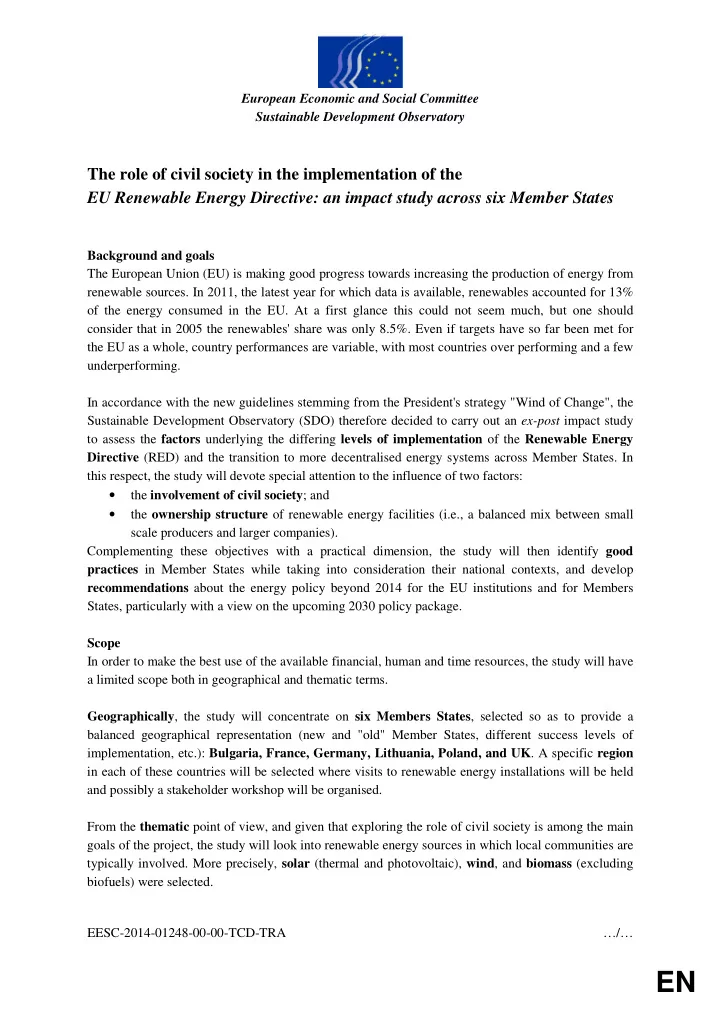

European Economic and Social Committee Sustainable Development Observatory The role of civil society in the implementation of the EU Renewable Energy Directive: an impact study across six Member States Background and goals The European Union (EU) is making good progress towards increasing the production of energy from renewable sources. In 2011, the latest year for which data is available, renewables accounted for 13% of the energy consumed in the EU. At a first glance this could not seem much, but one should consider that in 2005 the renewables' share was only 8.5%. Even if targets have so far been met for the EU as a whole, country performances are variable, with most countries over performing and a few underperforming. In accordance with the new guidelines stemming from the President's strategy "Wind of Change", the Sustainable Development Observatory (SDO) therefore decided to carry out an ex-post impact study to assess the factors underlying the differing levels of implementation of the Renewable Energy Directive (RED) and the transition to more decentralised energy systems across Member States. In this respect, the study will devote special attention to the influence of two factors: • the involvement of civil society ; and • the ownership structure of renewable energy facilities (i.e., a balanced mix between small scale producers and larger companies). Complementing these objectives with a practical dimension, the study will then identify good practices in Member States while taking into consideration their national contexts, and develop recommendations about the energy policy beyond 2014 for the EU institutions and for Members States, particularly with a view on the upcoming 2030 policy package. Scope In order to make the best use of the available financial, human and time resources, the study will have a limited scope both in geographical and thematic terms. Geographically , the study will concentrate on six Members States , selected so as to provide a balanced geographical representation (new and "old" Member States, different success levels of implementation, etc.): Bulgaria, France, Germany, Lithuania, Poland, and UK . A specific region in each of these countries will be selected where visits to renewable energy installations will be held and possibly a stakeholder workshop will be organised. From the thematic point of view, and given that exploring the role of civil society is among the main goals of the project, the study will look into renewable energy sources in which local communities are typically involved. More precisely, solar (thermal and photovoltaic), wind , and biomass (excluding biofuels) were selected. EESC-2014-01248-00-00-TCD-TRA …/… EN
- 2 - Methodology A variety of methods will be employed, but given that quantitative assessments have already been performed by other institutions, more emphasis will be put on qualitative methods capable of extracting in-depth information from stakeholders. Questionnaires , interviews , workshops , visits to renewable energy installations and a literature review are among the chosen methods. Relevant statistics will provide background information to better frame and interpret these data. The information obtained will then be treated and compiled into a report addressing the main project goals. The first stakeholder workshop will be held in Germany. This sort of public kick-off event will count with the participation of the entire team of nine Members and serve as a learning exercise to help preparing subsequent local visits and workshops. Outputs The main output will be a report identifying: a) the main factors accounting for the different levels of implementation of the RED across Member States, emphasising in particular the role of civil society and of a balanced ownership structure of renewable installations in that respect; b) good (and eventually bad) practices in the six selected Member States, each country featuring in the report as a case-studies; c) policy recommendations to the European Institutions and to Member States. The report will be made freely available in electronic format. In order to disseminate the report among a broader public, a summary brochure with an attractive design will also be prepared. In addition to several stakeholder workshops already mentioned, a final workshop with local, national and EU level stakeholders in Brussels will be organised in order to discuss a draft version of the report. Team The study will be prepared by a group of nine SDO Members: • a core team of three Members that will guide the work, visit all selected Member States and draft the final report: Ms Caño Aguilar, Ms King, and Mr Ribbe ; • an enlarged team of six Members from the selected Member States. Each of these Members will be responsible for drafting their respective case-study, namely by contributing to the collection and analysis of information, establishing contacts with local stakeholders, and supporting the organization of site visits. The national Members are: Mr Chwiluk (Poland), Mr Coulon (France), Mr Jones (UK), Mr Ma č iulis (Lithuania), Mr Stoev (Bulgaria), and Mr Van Oorschot (Dutch member responsible, along with Mr Ribbe, for the study visit to Germany) . EESC-2014-01248-00-00-TCD-TRA …/…
- 3 - Local Civil Society Organisations and partners in each of the six Member States will provide further support to streamline stakeholder contacts, to organise a workshop or interviews and site visits, and to review information at the national and local levels. The SDO Secretariat will provide continuous support and input throughout the process. Indicative timeline Debate about local renewable initiatives 4 November 2013 Project kick-off meeting 27 November 2013 Background research: literature review, as well as questionnaires, telephone January – March 2014 interviews (if needed) and workshops (in some cases) with national and local stakeholders Visits to renewable energy installations in the six Member States March – June 2014 Draft final report 25 June 2014 Stakeholder workshop in Brussels to discuss the draft report July 2014 Final report and summary brochure September 2014 EESC-2014-01248-00-00-TCD-TRA
Recommend
More recommend